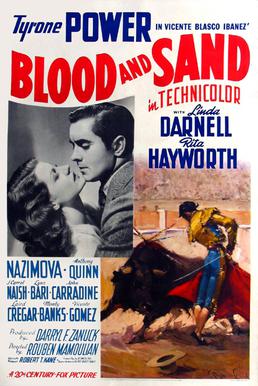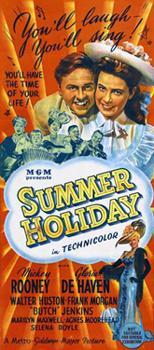
Laura is a 1944 American film noir produced and directed by Otto Preminger. It stars Gene Tierney, Dana Andrews, and Clifton Webb along with Vincent Price and Judith Anderson. The screenplay by Jay Dratler, Samuel Hoffenstein, and Betty Reinhardt is based on the 1943 novel Laura by Vera Caspary. Laura received five nominations for the Academy Awards, including for Best Director, winning for Best Black and White Cinematography. In 1999, Laura was selected for preservation in the United States National Film Registry by the Library of Congress as being "culturally, historically, or aesthetically significant". The American Film Institute named it one of the 10 best mystery films of all time, and it also appears on Roger Ebert's "Great Movies" series.

Love Me Tonight is a 1932 American pre-Code musical comedy film produced and directed by Rouben Mamoulian, with music by Rodgers and Hart. It stars Maurice Chevalier as a tailor who poses as a nobleman and Jeanette MacDonald as a princess with whom he falls in love. It also stars Charles Ruggles as a penniless nobleman, along with Charles Butterworth and Myrna Loy as members of his family.

Heaven Can Wait is a 1943 Technicolor American supernatural comedy film produced and directed by Ernst Lubitsch. The screenplay was by Samson Raphaelson based on the play Birthday by Ladislaus Bus-Fekete. The music score was by Alfred Newman and the cinematography by Edward Cronjager.

Becky Sharp is a 1935 American Technicolor historical drama film directed by Rouben Mamoulian and starring Miriam Hopkins who plays the eponymous protagonist. She was nominated for the Best Actress Oscar. Other supporting cast were William Faversham, Frances Dee, Cedric Hardwicke, Billie Burke, Alison Skipworth, Nigel Bruce, and Alan Mowbray.

Gene Eliza Tierney was an American film and stage actress. Acclaimed for her great beauty, she became established as a leading lady. She was best known for her portrayal of the title character in the film Laura (1944), and was nominated for an Academy Award for Best Actress for her performance as Ellen Berent Harland in Leave Her to Heaven (1945).

The Mark of Zorro is a 1940 American black-and-white swashbuckling film released by 20th Century-Fox, directed by Rouben Mamoulian, produced by Darryl F. Zanuck, and starring Tyrone Power, Linda Darnell, and Basil Rathbone.

Rouben Zachary Mamoulian was an American film and theater director.

William H. Daniels ASC was a film cinematographer who was best-known as actress Greta Garbo's personal lensman. Daniels served as the cinematographer on all but three of Garbo's films during her tenure at Metro-Goldwyn-Mayer, including Torrent (1926), The Mysterious Lady (1928), The Kiss (1929), Anna Christie (1930), Grand Hotel (1932), Queen Christina (1933), Anna Karenina (1935), Camille (1936) and Ninotchka (1939). Early in his career, Daniels worked regularly with director Erich von Stroheim, providing cinematography for such films as The Devil's Pass Key (1920) and Greed (1924). Daniels went on to win an Academy Award for Best Cinematography for his work on The Naked City (1948).

Queen Christina is a pre-Code Hollywood biographical film, produced for Metro-Goldwyn-Mayer in 1933 by Walter Wanger and directed by Rouben Mamoulian. It stars Swedish-born actress Greta Garbo and John Gilbert in their fourth and last film together.

High, Wide and Handsome is a 1937 American musical western film starring Irene Dunne, Randolph Scott, Alan Hale Sr., Charles Bickford and Dorothy Lamour. The film was directed by Rouben Mamoulian and written by Oscar Hammerstein II and George O'Neil, with lyrics by Hammerstein and music by Jerome Kern. It was released by Paramount Pictures.

Blood and Sand is a 1941 American Technicolor film drama starring Tyrone Power, Linda Darnell, Rita Hayworth and Nazimova. Directed by Rouben Mamoulian, it was produced by 20th Century Fox and was based on the 1908 Spanish novel Blood and Sand by Vicente Blasco Ibanez. The supporting cast features Anthony Quinn, Lynn Bari, Laird Cregar, J. Carrol Naish, John Carradine and George Reeves. Rita Hayworth's singing voice was dubbed by Gracilla Pirraga.

Applause is a 1929 American backstage musical " talkie" directed by Rouben Mamoulian and starring Helen Morgan, Jack Cameron, and Joan Peers. It was shot at Paramount's Astoria Studios in Astoria, New York during the early years of sound films.

City Streets is a 1931 American Pre-Code romantic melodrama directed by Rouben Mamoulian from a story by Dashiell Hammett and stars Gary Cooper, Sylvia Sidney and Paul Lukas.

Golden Boy is a 1939 American drama romance sports film directed by Rouben Mamoulian and starring Barbara Stanwyck, Adolphe Menjou and William Holden. It is based on the 1937 play of the same title by Clifford Odets.

Silk Stockings is a 1957 American musical romantic comedy film directed by Rouben Mamoulian and starring Fred Astaire and Cyd Charisse. It is based on the 1955 stage musical of the same name, which had been adapted from the film Ninotchka (1939). The film was choreographed by Eugene Loring and Hermes Pan.

Summer Holiday is a 1948 American musical-comedy film, directed by Rouben Mamoulian and starring Mickey Rooney and Gloria DeHaven. The picture is based on the play Ah, Wilderness! (1933) by Eugene O'Neill, which had been filmed under that name by MGM in 1935 with Rooney in a much smaller role, as the younger brother. Although completed in October 1946, the film sat on the shelf until 1948.

We Live Again is a 1934 American film directed by Rouben Mamoulian and starring Anna Sten and Fredric March. The film is an adaptation of Leo Tolstoy's 1899 novel Resurrection (Voskraeseniye). The screenplay was written by Maxwell Anderson with contributions from a number of writers, including Preston Sturges and Thornton Wilder.

The Song of Songs is a 1933 American pre-Code romantic drama film directed by Rouben Mamoulian and starring Marlene Dietrich. This Paramount picture is based on the Hermann Sudermann novel Das Hohe Lied (1908) and the play The Song of Songs (1914) by Edward Sheldon.

The Gay Desperado is a 1936 American musical-comedy film starring Ida Lupino, Leo Carrillo, and Nino Martini and directed by Rouben Mamoulian, produced by Mary Pickford and Jesse Lasky and originally released by United Artists. The film is a spoof of the Hollywood gangster genre.
Ten Gentlemen from West Point is a 1942 American Western film directed by Henry Hathaway and starring George Montgomery, Maureen O'Hara and John Sutton. Its cinematography was nominated for an Academy Award in 1943. George Montgomery replaced John Payne who was suffering an emotional upset at the time. The story tell a fictional story of the first class of the United States Military Academy in the early 1800s.


















